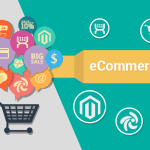- admin
- 0 Comments
- 934 Views
Shopify is a well-liked one-stop shop for setting up and managing online stores. Even a simple blog can be easily managed with its integrated CMS. But will Shopify CMS for the e-commerce store satisfy your content requirements? The first question is: Is Shopify even a CMS? A content management system (CMS) is a piece of software created for the creation, management, modification, and publication of material. Shopify may function as a content management system (CMS) for updating product details and descriptions. However, it only lets you make simple blogs. A more capable content management system is required if you want to contribute rich, dynamic content in several languages.
Shopify is an e-commerce platform; in 2023, it produced $4.1 billion in revenue from merchant solutions! It might be a good CMS for organizing product descriptions. However, there are better options for pages and manuals with such content. You can use Shopify’s content management tools while being conscious of its limits if you think of it as a CMS.
Features of Shopify CMS:
The Ultimate Ecommerce CMS is Shopify:
Are you looking for a simple way to create and manage your online store? For e-commerce companies looking for a user-friendly website builder and content management system, Shopify is the ideal option.
- Simple Customization with Drag and Drop Capabilities:
With Shopify’s simple drag-and-drop capability, tailoring your store to meet your niche is simple. Drag and drop functionality in Shopify’s user-friendly interface lets you build your storefront without paying a designer, saving you money.
- Every Industry Has Built-In Themes:
From many themes, you can choose the perfect piece for your online store. For a website that looks excellent on both desktop computers and mobile devices, pick a responsive theme.
- Hosting that is secure and integrated with payments.
- When it comes to safe hosting with limitless bandwidth, Shopify has your back.
- Enjoy peak performance even when there is much traffic without having to worry about downtime or slow site loading.
- Shopify includes SSL security certifications as standard, safeguarding the privacy of your client’s personal information when they shop at your store.
- No more worrying about hackers obtaining private data!
- With Shopify’s integrated payment system, your customers can shop without anxiety.
- Built-in support: Right out of the box, Shopify supports well-known payment processors, including PayPal, Stripe, Amazon Pay, and Apple Pay. There is no need for laborious setup procedures.
- Currency conversion: You may sell to overseas consumers without breaking a sweat (or confusing them), thanks to the multi-currency capabilities offered in some plans.
- Fraud protection: Cutting-edge fraud detection systems guard against fraudulent transactions for both you and your customers.
Shopify Blogging:
With the inclusion of a built-in blogging tool that syncs up with your online store, Shopify has upped its game. The Shopify blog functionality seamlessly integrates with your current store design to provide your website with a unified appearance and experience. You may improve each article using Shopify’s SEO-friendly features by including meta titles, descriptions, and tags that let search engines know what your material is about.
How to Manage a Blog on Shopify?
- Produce useful content: Write helpful articles that address typical issues clients have with your products or sector.
- Repetition is key: Regularly posting new blog entries will keep readers interested and returning for more.
- Promote on social media: Post links to your blog entries on a variety of social media sites to reach a larger audience and encourage people to visit your online store again.
Content at Scale is a fantastic choice if you wish to complete steps 1 and 2 more successfully. Additionally, you may publish your blog article from Content at Scale directly to your Shopify store using the plugin for Shopify integration.
Merits And Demerits Of Shopify CMS:
Merits of Shopify CMS:
When considering whether a CMS is a good fit for your company, you must weigh the advantages and disadvantages. Shopify is a good choice as a CMS due to a number of benefits, including:
- No Restrictions On Design And Built-In Themes:
Customers of Shopify have access to the Shopify theme store, which offers over 70 free and paid layouts. Shopify’s built-in templates may aid e-commerce businesses in standing out from the competition because a CMS has the goal of helping companies provide clients with high-quality websites. Since merchants have complete control over the HTML and CSS for every theme, they are free to modify them as they see fit.
- Easy Ways To Add, Edit, And Remove Products:
Typically, the products that will be offered to clients are the focus of the content for an e-commerce store. Shopify makes it simple for businesses to maintain the details for those products by allowing them to rapidly add new products and edit existing ones, as well as product descriptions and images. Images may be easily arranged using drag-and-drop capabilities, and merchants can control other material like blogs and pages from the same interface.
- Boost Shopify Hosting:
All Shopify stores have unlimited bandwidth and safe hosting. This feature is essential for sites with much content because it eliminates the need to look for a third party to help manage many content assets.
- Utilize Shopify’s Wide Range of Features:
Shopify CMS also provides a variety of additional useful capabilities for e-commerce marketing. It features a one-click Google Product Search submission and is SEO-optimized so that your store may rank for important keywords. Shopify is an attractive option for an e-commerce CMS due to its e-commerce-focused functionality and capacity for integrating additional tools.
Demerits of Shopify CMS:
Many advantages have previously been mentioned that make using Shopify as a CMS beneficial. However, Shopify CMS only sometimes works for big businesses with plenty of content assets and clients or even for smaller companies with more intricate needs.
- Limitations of the Theme:
Although Shopify offers a good number of starter themes, they have limitations by Liquid and SSR, Shopify’s template language. Since Liquid is exclusive to Shopify, developers can quickly update the HTML and CSS for straightforward changes. However, additional customizations may be more challenging.
Additionally, rather than creating static websites, Shopify uses server-side rendering. The ultimate consequence is a front-end experience that could be more active and allow front-end developers to utilize ideas like Jam stack.
- Designed for Commerce, Not Content:
Shopify has features for order processing, inventory management, and e-commerce. Because it isn’t particularly suitable for content, Shopify has fewer features than other systems made for CMSs. It is especially clear when handling the front-end user experience. Shopify works well for a straightforward blog that’s connected to your e-commerce business. However, there are better options than this when you want to build a more compelling user experience that engages visitors and supports content marketing.
- Non-Headless Content Platform:
Customers increasingly want to see content and shop online using any device they can get their hands on. While Headless Commerce is made possible with Shopify Plus, Headless Content Management is not. As a result, Shopify’s CMS will not be able to create and send content to tablets, digital kiosks, and other mediums.
- Not Designed for Speed:
Modern shopping experiences depend heavily on speed. However, Shopify isn’t speed-optimized and can take a while to load, especially in mobile-first environments. Rate becomes a problem when an e-commerce store has too many visuals, which are essential for content. It is a limitation of Shopify’s content management capabilities, given that Core Web Vitals emphasizes speed as a component of the user experience.
- Small Business Features:
The fact that Shopify has few enterprise functionality is another major issue with using it as a CMS. For instance, it may be challenging for several people to handle content in Shopify since they require procedures to avoid obstructing one another and to plan and schedule material. Sadly, Shopify is missing this essential functionality.
- Insufficient Shopify Plugins:
Many e-commerce business owners use the variety of plugins at their disposal to make up for Shopify’s lack of capabilities. However, this could be counterproductive because having too many plugins can make your Shopify store even slower.
Conclusion:
Instead of being a conventional content management system (CMS), Shopify is primarily an E-commerce platform. Although it does include certain fundamental content management features, its main goals are to facilitate online sales and maintain product catalogs. A built-in blogging platform from Shopify lets you make and manage blog articles as well as simple content pages. Drag-and-drop functionality makes it simple to change the look and layout of your Shopify site, and you get safe hosting with SSL security certificates and convenient payment integration capabilities out of the box.
Shopify CMS is a suitable choice for e-commerce businesses that prioritize product management and simple content needs. However, for companies with more advanced content requirements or larger-scale operations, exploring other CMS options might be beneficial.


